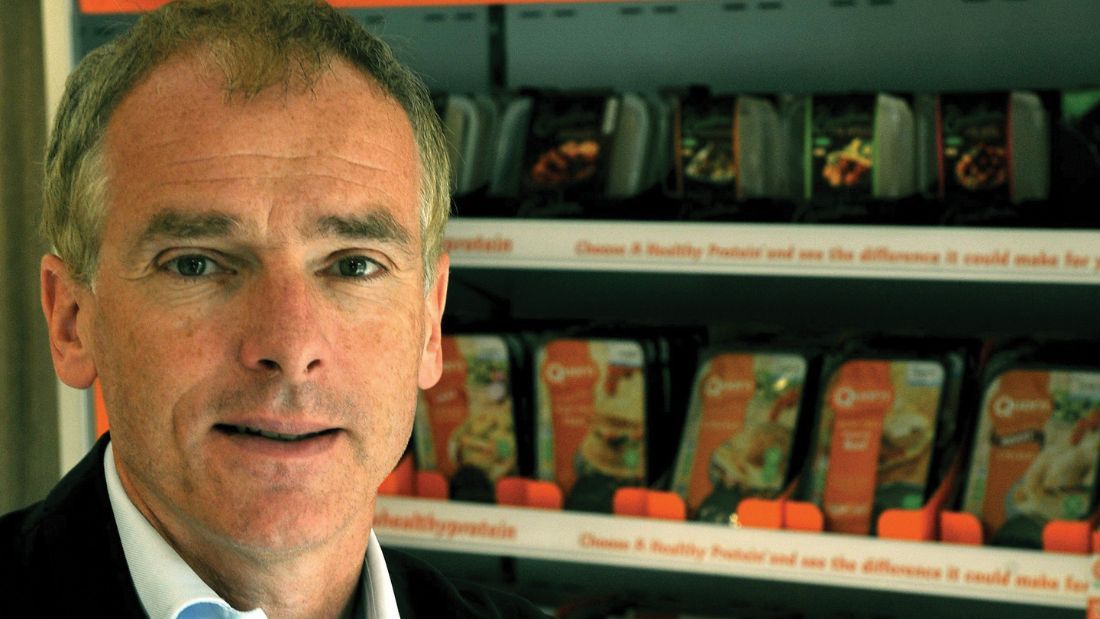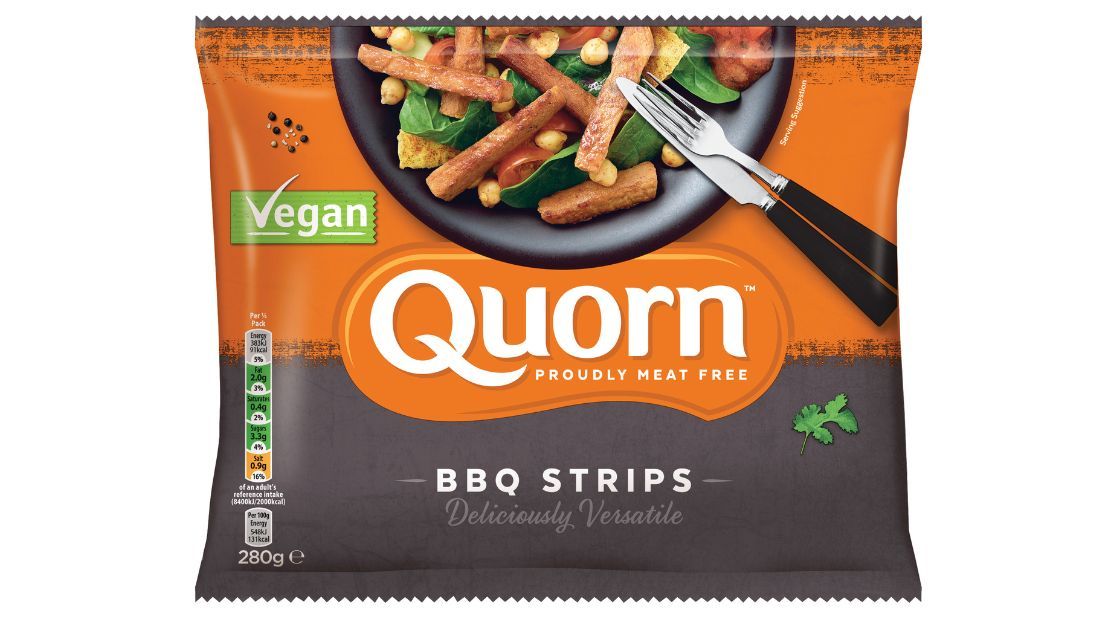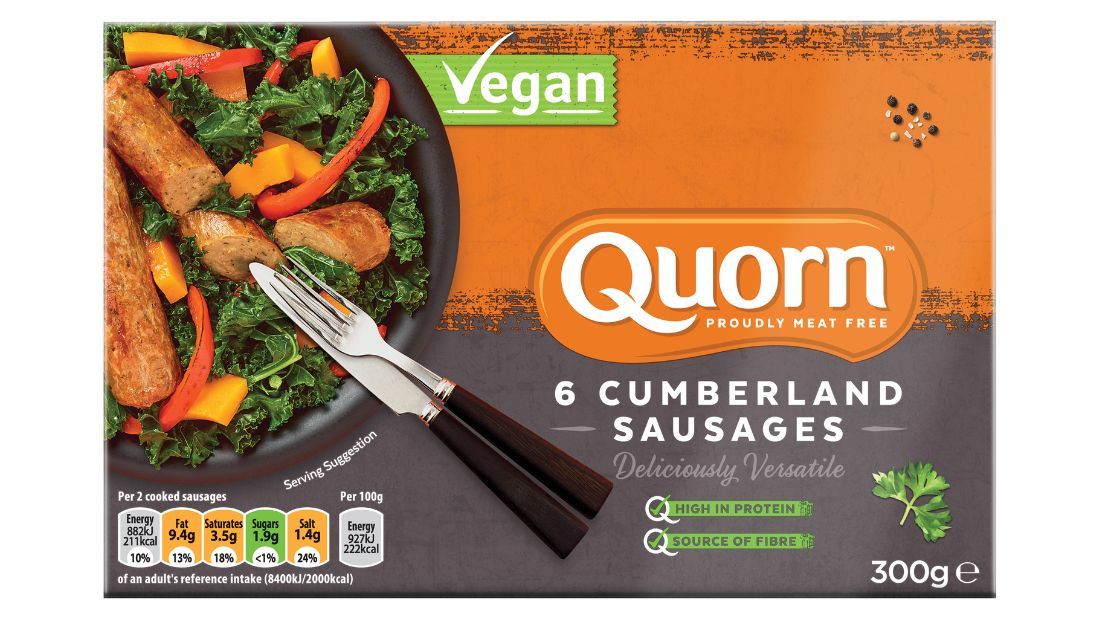The King of Quorn – Interview with Kevin Brennan

Kevin Brennan, CEO of Quorn reveals his passion for saving the planet and animals to Juliet Gellatley, Founder & Director of Viva!
Featured in Viva!life 69/Winter 2018
- Please note: This interview took place in 2018. Kevin Brennan is no longer CEO of Quorn, and the Quorn range has since changed.
Every day I talk to people on what I call the road to compassion. Those at the start are usually reaching out for alternatives to familiar foods and the brand I hear them mention most is Quorn.
So, it was with interest that I met Kevin Brennan, the CEO of this trail-blazing brand. We had a long chat in a coffee shop in the bustling town of Altrincham, Cheshire. Seemingly mild mannered and unassuming, it quickly became obvious that he is also determined and very successful. He displays not a trace of arrogance or self-satisfaction about what’s been achieved. Quorn’s growth grew partly out of his genuine belief in its benefits but it soon became evident that he has a real passion for saving the planet. That passion seems to have surprised even him!
Quorn launched as a vegetarian meat-alternative with a solitary pie in 1985, then owned by Marlow Foods. There are now over 100 products! Quorn is made from mycoprotein, obtained by fermenting a fungus (Fusarium venenatum) in tanks using nutrients from wheat and maize. Minerals are added so that it grows abundantly. For binding, either a small amount of egg white is added to vegetarian products (more on this later!) or potato extract in vegan products.
Interestingly, the first flirtation with mycoprotein developed in the 1960s out of concern that the world needed a sustainable way of producing protein for an expanding population. Today, Quorn is owned by a huge noodle company in the Phillipines, Monde Nissin, but its HQ is still in Stokeley, Yorkshire. Since Kevin joined Quorn in 2010, its success has skyrocketed, with sales in 2017 totalling £205m.


The UK is by far its biggest market, though Quorn is now exporting to 20 different markets and the company is on track to become a billion dollar business by 2027. I asked him why he thought Quorn is so popular.
“Whether people buy meat-free for health or ethical reasons, they still want to enjoy their food! Quorn’s popularity comes from its superior texture. We make it to a standard where the gap between eating meat and Quorn is quite narrow and therefore the compromise for people isn’t that great.
“Everywhere else in the world, producers seem to be fixated on burgers and sausages but we’ve created a much wider choice – and it’s growing in the UK at nearly 20 per cent annually.”
I ask Kevin what he thinks is driving the phenomenal growth in meat-free and whether the rise of veganism is global?
“Interest in health is huge; concern about the environment is becoming a major factor and there’s no question that the growth in veganism is real – it’s not a fad. It is a worldwide phenomenon and we’re growing in the US, Australia, Scandinavia – in fact, most of Europe. Attitudes to the word ‘vegan’ have flipped in such a short period of time and speaks to what Viva! has achieved – veganism has become aspirational. Although most people are not vegan, many now see it as positive.
“It’s been driven by an array of troubling stuff about the meat and dairy industries, making people think. Whether it’s Two Sisters’ re-dating of chicken meat or selling stuff picked off the floor; or horse gate, or the Netflix generation who’ve absorbed Cowspiracy, Rotten, What the Health… and seen investigations from groups like yours. What was once fringe behaviour – veganism – is now a sensible choice! It is a culmination of everything.”
Quorn is clearly proud of being a much healthier product than meat but Kevin keeps coming back to the environment:
“We started working on sustainability about six years ago. To be honest, we didn’t realise the scale of the damage being done by meat and dairy. You’d talk to people about cows being worse than cars for greenhouse gas emissions and destroying the environment and they’d give you a funny look! In five years it has transformed and the world view has repositioned veganism as mainstream.
“We can’t address climate change without changing our eating habits. There isn’t a country in the world that’s going to meet its greenhouse gas targets unless it addresses food and the single biggest thing a consumer can do is to cut down or stop consuming meat.”

I put it to Kevin Brennan that one of the great things about veganism is that it is entirely up to you. You don’t have to lobby the PM (god forbid!) or get anyone’s permission so the most important change of all is in our own hands. I ask whether he thinks the government is doing enough to educate people about the benefits of veganism (that’s a no!) and should companies such as Quorn be receiving government subsidies?
“You’re not going to get the change necessary through a bit of consumer advertising. If governments don’t act, we won’t get there and at the moment they’re playing no part. Even worse, all European and UK beef farmers are subsidised so people don’t have to pay the full price of beef nor do they pay for any of the environmental damage caused, like the pollution of waterways and greenhouse gas emissions.
“It’s bizarre – a product that’s unsustainable and is making whole populations unhealthy is subsidised! The world’s governments have to act and slowly they are waking up and lots of cities are now talking about needing new food policies.”
Veganism is clearly the most sustainable and kind diet so I ask Kevin the big Q: is Quorn going to become 100 per cent vegan? I thought he might try to deflect the question but he didn’t:
“In an ideal world Quorn would be vegan and that’s our ambition but we still have a lot of manufacturing challenges. Vegan is more sustainable and has a wider reach. Also, for industry, there are continual challenges around eggs with diseases such as avian flu. There are issues of animal welfare and while we do use free-range eggs, it’s a field I’d rather not be dealing with. But it is the big block and there’s a lot of effort now going into searching for alternatives so I’m confident – I can’t put a time on it – that we will find the right way forward.”
Quorn now have 14 vegan products – including Smoky Ham Free Slices, BBQ Strips, burgers, sausages, fillets, nuggets and Cranberry Balls. What took them so long?
“Quorn is essentially a combination of protein and fibre whose texture is OK but it needs a binding agent to hold it together. Egg white works well and is what the original developers used. Prior to my joining Quorn, it wasn’t being looked at but I knew it needed addressing. So, my starting point was, ‘let’s find a solution!’ I had no idea how hard it would be! We eventually found a potato protein that does much the same job as egg and we’ve done some work with a type of algae. There were a lot of manufacturing challenges but we are really investing in vegan products for many good reasons.”
In 2010, two thirds of Quorn sales came from vegetarians but today it has turned on its head and most sales are from meat eaters. “Probably half the UK is now ‘flexitarian’ – active meat reducers looking for healthier choices and Quorn is dramatically healthier than meat.”
Kevin Brennan has made massive strides with Quorn and intends to make it the best vegan meat-alternative in the world, with remarkably green credentials. The carbon footprint of Quorn’s core mycoprotein has been cut, giving its popular vegetarian mince a 90 per cent lower carbon footprint than its beef equivalent.
This year, Quorn are spending £7 million on developing more vegan products, including its own bleeding burger. And the progressive thinking is paying off – Australian sales are up 50 per cent, US up 23 per cent. There’s no doubt, that Quorn has helped millions of people walk the road to compassion – many reaching Destination Vegan.
